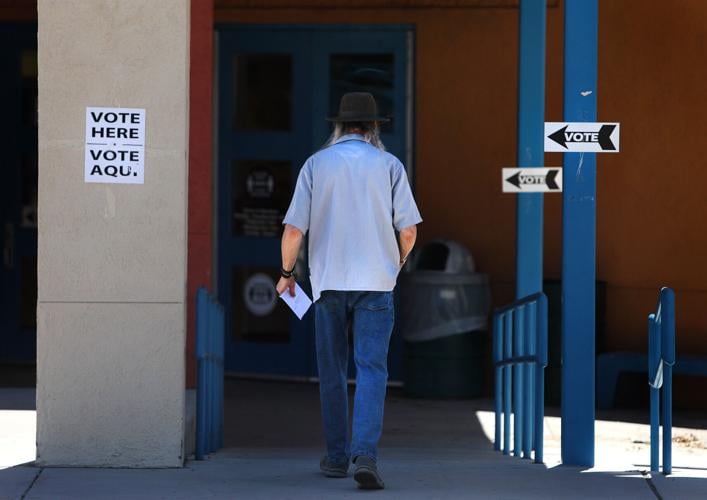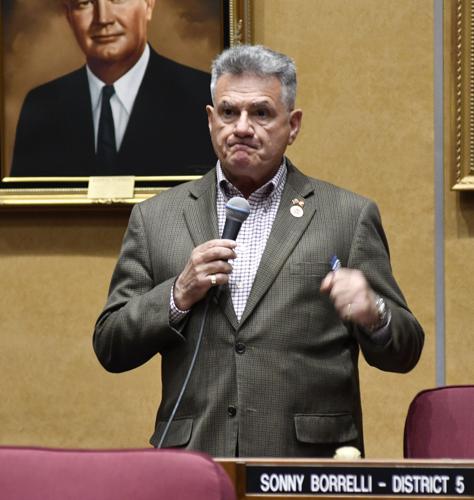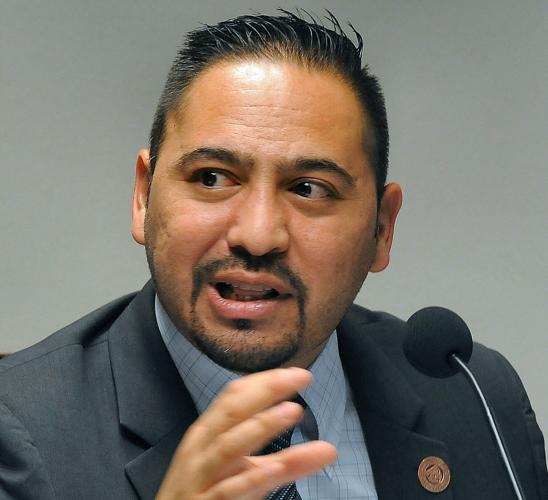PHOENIX — Republican legislative leaders want a federal judge to unhear — or at least ignore — the testimony of a former Democratic lawmaker about racially motivated comments he said were made by current Senate Majority Leader Sonny Borrelli.
In court filings, an attorney for the GOP lawmakers, Kory Langhofer, does not argue that Borelli didn’t make the comments to then-Sen. Martin Quezada.
Those comments, Quezada told Capitol Media Services, were “one offensive thing after another.’’
Borrelli said dead people and “illegals’’ were being registered to vote, Quezada said.
Quezada quoted Borelli as saying to him, “’If your people weren’t doing that, we wouldn’t have to bring these bills’.”
The issue is in court because civil rights groups and the U.S. Department of Justice are asking a federal judge to void a pair of Arizona laws approved in 2022 by the Republican-controlled Legislature that they say were specifically designed to deter minorities from voting.
If U.S. District Court Judge Susan Bolton finds the laws were enacted with “discriminatory intent,’’ that will mean they run afoul of the federal Voting Rights Act.
Langhofer’s complaint is that the challengers did not disclose that Quezada would be testifying about his conversations with Borrelli.
He said that did not give him and other attorneys for the state a chance to question Quezada before he testified, which he said amounts to “gamesmanship.’’

Martin Quezada
But Ernest Herrera, an attorney with the Mexican American Legal Defense and Educational Fund, countered that Quezada was on a list given to the state of witnesses to be called. It is the fault of the lawyers defending the laws for failing to question him ahead of time to know what he might say, Herrera said.
Borrelli denies making comments
Top GOP leaders who are defending the laws say they are just common-sense changes to ensure only those eligible to vote can cast ballots.
The civil rights groups dispute that, and testimony about what Borrelli said could help them build their case.
“I said no such thing,’’ Borrelli, a Lake Havasu City Republican, told Capitol Media Services. “He is either hallucinating or completely fabricating for political gain, period,” he said of Quezada, who left the Senate to run for statewide office.
Still, Borrelli said he had not seen or heard exactly what was said by Quezada.
“I’ve heard he said things,’’ Borrelli said, declining to answer further questions.
The two laws contain multiple provisions.
Bolton already barred the state from enforcing one, which said only those individuals who produce proof of citizenship can vote for president.
She said while lawmakers are free to set certain requirements for state and local elections, the National Voter Registration Act spells out that anyone who uses a form designed by the Election Assistance Commission can vote in federal elections. That form mandates only that applicants sign a sworn statement avowing, under penalty of perjury, they are in fact citizens.
Issues before the judge
Still pending are several other issues.
One would require county recorders to forward to the attorney general the names of people who are suspected of trying to register without being citizens.
Challengers say that referral can be based solely on the inability of the recorder to locate these names in certain specific databases. They say use of those databases would “amount to intentional race, national origin, and alienage discrimination.’’
Also yet to be decided is the legality of a new requirement for voters to provide documentary proof of residency — where they live — above and beyond what already was necessary.
All this goes to the issue of whether Republican lawmakers had a legitimate — and non-racial — basis to approve the laws.
The challengers say otherwise.
“The proof of citizenship restriction continues a baseless assault on Arizona’s elections based on a conspiracy theory that non-citizens are voting, despite a persistent lack of credible evidence to support such claims,’’ the lawsuit says. “It is the newest in a series of cynical and bad faith attempts to use these politically motivated and false allegations to limit access to voting by eligible, lawful citizens.’’
The laws were defended by former Attorney General Mark Brnovich, a Republican, until he left office in January. But current Attorney General Kris Mayes, a Democrat, did not defend all the provisions.
So House Speaker Ben Toma, R-Peoria, and Senate President Warren Petersen, R-Gilbert, got permission from Bolton to intervene and defend both laws. They denied that the laws targeted voters of color.
“Came into my office and apologized”
That leaves it to Bolton to decide whether there was a racial motive behind the law, and whether what Quezada has to say could be relevant and should be considered as evidence.
“The substance of my testimony was really about the technical aspects of the bill, what it did, why it hurt people, why it was bad, and why it hurts certain communities like my own,’’ Quezada told Capitol Media Services. He said he spoke about what he saw as prior measures by the Republican-controlled Legislature to suppress minority voting in Arizona and how judges in other cases have said those laws have a disparate impact on communities of color.
That, in turn, led attorneys for the challengers to ask him about comments from other lawmakers about why they have enacted these kinds of bills. And Quezada, who sat next to Borrelli on two committees, said he heard a lot from him.
“There were times when he talked about, ‘Well, this is because there are people in your area that are committing these crimes,’ ‘’ he said Borrelli told him, things like “registering dead people or people coming across the border and voting.’’
Quezada said he told the court these kinds of comments weren’t unique. He said he also testified that at one point Andy Biggs, who was president of the Senate at the time, made Borrelli go to Quezada’s office “and apologize for some of the offensive things he said.’’
“And I remember that vividly because he came into my office and apologized — and then went off to say other offensive things on top of that,’’ Quezada said.
Borrelli said that never happened.
Langhofer is arguing that the testimony is inadmissible because the challengers, in disclosing their witness list, “opaquely described Quezada’s testimony as ‘information regarding the challenged laws, including the origin, funding, sponsorship, merit, legality, lobbying, support, and legislative history.’ ‘’
Only when Quezada was on the stand, Langhofer said, did the attorneys for the challengers question him about conversations he said he had with Borrelli — conversations he said were not disclosed to attorneys for Petersen and Toma.
Langhofer said federal rules prohibit a party from using information that was not provided in advance. He wants Bolton to not just ignore it but also strike it from the record.
Herrera, from the Mexican American Legal Defense and Educational Fund, one of the groups that is suing, said the fact that Langhofer and others were taken by surprise is their own fault. Quezada was disclosed before trial as a “person with information,” he said.
“Intervenors had time to notice Mr. Quezada for a deposition — depositions proceeded until close to the time of trial — but they did not do so,’’ Herrera told Bolton. He said it was clear the witnesses were being called by challengers to provide information on “legislative intent, including inquiries about the involvement of particular legislators and third parties in the passage of the challenged laws.’’
Bolton has not said when she will rule.
Previous ruling
All this comes as Toma and Petersen lost their own bid to refuse to answer questions from the challengers about their backing of both bills. Both argued that would violate the concept of “legislative privilege,’’ which generally says lawmakers need not answer questions about their thinking.
But Bolton ruled — and the U.S. Supreme Court agreed — that the information sought goes to the heart of the constitutionality of the law.
“Motive is most often easily discovered by examining the unguarded acts and statements of those who would otherwise attempt to conceal evidence of discriminatory intent,’’ Bolton wrote.
Get your morning recap of today's local news and read the full stories here: tucne.ws/morning






